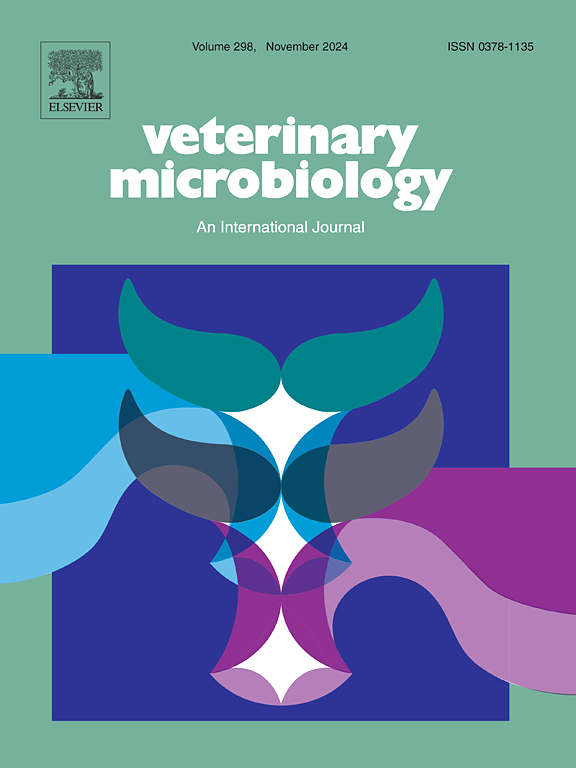Synthetic peptide vaccines targeting SVA elicit robust protective immune responses in swine
IF 2.7
2区 农林科学
Q3 MICROBIOLOGY
引用次数: 0
Abstract
Senecavirus A (SVA), an emerging pathogen in swine, causes vesicular disease with clinical manifestations similar to foot-and-mouth disease (FMD), vesicular stomatitis (VS), and swine vesicular disease (SVD), posing a significant economic threat to the global swine industry. Therefore, it is of vital importance to develop a safe and effective SVA vaccine. In this study, guided by the principles of synthetic biology, we designed and synthesized two SVA candidate synthetic peptides, TT-073 and TT-074, based on the highly conserved B-cell neutralizing epitope VP2150–160aa from the SVA capsid protein, and a helper T-cell epitope derived from the F protein of the urticaria virus. These peptides were synthesized using solid-phase peptide synthesis (SPPS). Initially, we systematically evaluated the immunogenicity of the synthetic peptides in mice when combined with various adjuvants. The results demonstrated that the Montanide ISA 50Vc adjuvant, in conjunction with the synthetic peptides, elicited the most robust immune response. Building upon this finding, we subsequently formulated the TT-073 and TT-074 synthetic peptide vaccines in varying dosage regimens with Montanide ISA 50Vc adjuvant for swine immunization. Compared to TT-073 synthetic peptide, the TT-074 synthetic peptide exhibited superior immunogenicity. Notably, the high-dose formulation of the TT-074 synthetic peptide induced higher levels of neutralizing antibodies (1:111) while effectively activating both humoral and cellular immune responses, thereby providing robust protection against SVA challenge. This study underscores the immense potential of synthetic biology in vaccine development and provides critical theoretical insights for the future development of synthetic peptide vaccines targeting other pathogens.
针对SVA的合成肽疫苗可在猪体内引起强大的保护性免疫反应。
塞内卡病毒A (Senecavirus A, SVA)是一种新型猪源病原体,可引起水疱性疾病,其临床表现与口蹄疫(FMD)、水疱性口炎(VS)和猪水疱病(SVD)相似,对全球养猪业构成重大经济威胁。因此,研制一种安全有效的SVA疫苗至关重要。本研究在合成生物学原理的指导下,基于SVA衣壳蛋白高度保守的b细胞中和性表位VP2150-160aa和来源于荨麻疹病毒F蛋白的辅助t细胞表位,设计合成了两个SVA候选合成肽TT-073和TT-074。这些肽是用固相肽合成(SPPS)技术合成的。最初,我们系统地评估了合成肽与各种佐剂联合在小鼠体内的免疫原性。结果表明,Montanide ISA 50Vc佐剂与合成肽结合,引发了最强大的免疫反应。基于这一发现,我们随后研制了TT-073和TT-074合成多肽疫苗,以不同剂量方案加入蒙塔尼德ISA 50Vc佐剂用于猪免疫。与TT-073合成肽相比,TT-074合成肽具有更强的免疫原性。值得注意的是,TT-074合成肽的高剂量配方诱导了更高水平的中和抗体(1:111),同时有效地激活了体液和细胞免疫反应,从而提供了针对SVA挑战的强大保护。这项研究强调了合成生物学在疫苗开发中的巨大潜力,并为未来开发针对其他病原体的合成肽疫苗提供了重要的理论见解。
本文章由计算机程序翻译,如有差异,请以英文原文为准。
求助全文
约1分钟内获得全文
求助全文
来源期刊

Veterinary microbiology
农林科学-兽医学
CiteScore
5.90
自引率
6.10%
发文量
221
审稿时长
52 days
期刊介绍:
Veterinary Microbiology is concerned with microbial (bacterial, fungal, viral) diseases of domesticated vertebrate animals (livestock, companion animals, fur-bearing animals, game, poultry, fish) that supply food, other useful products or companionship. In addition, Microbial diseases of wild animals living in captivity, or as members of the feral fauna will also be considered if the infections are of interest because of their interrelation with humans (zoonoses) and/or domestic animals. Studies of antimicrobial resistance are also included, provided that the results represent a substantial advance in knowledge. Authors are strongly encouraged to read - prior to submission - the Editorials (''Scope or cope'' and ''Scope or cope II'') published previously in the journal. The Editors reserve the right to suggest submission to another journal for those papers which they feel would be more appropriate for consideration by that journal.
Original research papers of high quality and novelty on aspects of control, host response, molecular biology, pathogenesis, prevention, and treatment of microbial diseases of animals are published. Papers dealing primarily with immunology, epidemiology, molecular biology and antiviral or microbial agents will only be considered if they demonstrate a clear impact on a disease. Papers focusing solely on diagnostic techniques (such as another PCR protocol or ELISA) will not be published - focus should be on a microorganism and not on a particular technique. Papers only reporting microbial sequences, transcriptomics data, or proteomics data will not be considered unless the results represent a substantial advance in knowledge.
Drug trial papers will be considered if they have general application or significance. Papers on the identification of microorganisms will also be considered, but detailed taxonomic studies do not fall within the scope of the journal. Case reports will not be published, unless they have general application or contain novel aspects. Papers of geographically limited interest, which repeat what had been established elsewhere will not be considered. The readership of the journal is global.
 求助内容:
求助内容: 应助结果提醒方式:
应助结果提醒方式:


